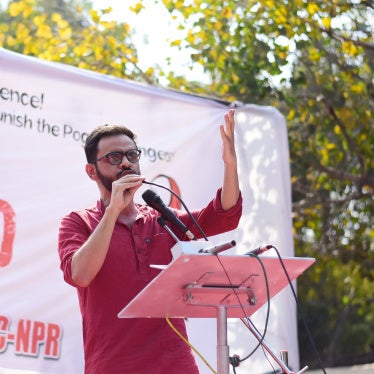In the aftermath of the deaths of six student protesters in Jakarta, Human Rights Watch today called on donor countries to toughen their policies toward Indonesia.
Human Rights Watch urged all member countries of the World Bank-chaired Consultative Group on Indonesia (CGI) to condition all non-humanitarian assistance to Indonesia, including their contributions to the International Monetary Fund, on the lifting of legal and administrative controls on the rights to freedom of assembly, expression, and association. It joined Indonesian human rights organizations in calling on the Indonesian government to invite the United Nations Special Rapporteur on Summary and Arbitrary Executions to the country as a matter of urgency to investigate these latest deaths. Human Rights Watch also joined Amnesty International in calling for a complete review by CGI member countries of military and security assistance to Indonesia in the wake of the deaths with a view toward halting transfers that could be used in human rights abuses.
"These killings were completely avoidable," said Sidney Jones, Asia director of Human Rights Watch. "It was an inexcusable use of lethal force against unarmed students and can only lead to a worsening of an already explosive situation." Evidence suggests that the security forces who fired down on the students from a highway overpass used live ammunition, despite the army's claim at a press conference that it used only rubber bullets and tear gas. According to one report, eleven persons were seriously injured, many of them with gunshot wounds, and seventeen had lighter injuries.
Human Rights Watch said the death toll might well rise, as two students were reported to be in a coma, and local human rights organizations were investigating reports of other deaths. Of the six known dead, all were enrolled at Trisakti University, a private university in central Jakarta where the shootings took place. Three of the victims, Alan Mulyadi, Vero, and Hendrawan, were economics students. Elang Mulia Lesmana was an architecture student, Hafidi Alfidin was in civil technology, and Heri Heriyanto was an industrial techonology major. The six have quickly acquired the status of martyrs and are already being called "Heroes of the Reformation."
Adi Andojo, the dean of the Trisakti law faculty, a respected former Supreme Court justice who was forced to step down after raising concerns about corruption within the court, said he was registering a protest against the security forces. "My students did not resist, they did not throw stones, they did not use violence," he told a local newspaper.
The security forces opened fire after a day-long peaceful demonstration on the Trisakti campus had dispersed. The students had wanted to march to the parliament building to carry their message urging political reform, but were prevented from doing so by a joint team of military police, the army, the regular police, and the mobile police brigade. Dean Andojo himself had negotiated an end to a standoff between students and troops just outside the campus, getting the students to withdraw back on to campus grounds if the troops withdrew as well. As the students were going back through the campus gates in an orderly fashion, a group surrounded a man they believed to be an intelligence agent and reportedly attempted to beat him up. In a sequence of events that remains unclear and needs a fully independent investigation, the scuffle over the alleged intelligence agent attracted the attention of other students, the security forces moved in on them, beating and kicking as they did so, and youths who may not have been students and who were well outside the campus began throwing bottles and rocks at the troops. It was apparently in an atmosphere of a complete melee that troops opened fire, into a crowd that included students trying to get out of the way.
Any investigation must include an inquiry into exactly where, how, and by whom the students were killed, and the circumstances under which lethal force was used.
Had the students been allowed to exercise their right to freedom of assembly beyond campus grounds, the shootings would not have occurred. More importantly, had the Indonesian government made a move toward lifting existing controls on participation in political activities, a way out of the escalating protests might have been found. Instead, the government decided to try to blockade students in their universities, ignore calls for reform, and deny students and other Indonesian citizens their fundamental civil rights.
In confronting the violence that did take place, the armed forces violated fundamental international principles set forth in the "Basic Principles on the Use of Force and Firearms by Law Enforcement Officials," a set of United Nations standards. Among the principles that appear to have been violated are that law enforcement officials should exercise restraint in the use of force and act in proportion to the nature of the threat they face; "minimize damage and injury and respect and preserve human life"; and use firearms only when less dangerous means are not practicable.
The killings came a time of increased human rights violations by the Indonesian government, including a rash of "disappearances" of political activists in February and March. While most of the "disappeared" resurfaced in recent weeks with reports that they had been held in a safehouse and tortured, several are still unaccounted for.








